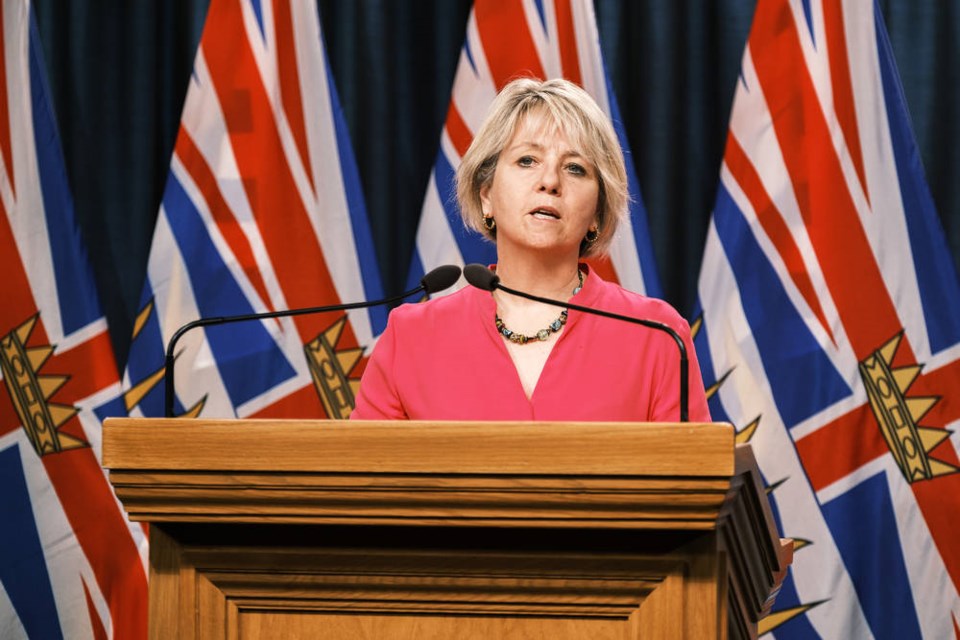Dr. Bonnie Henry hopes to ease pandemic restrictions on gatherings in time for Family Day if the trajectory of new COVID-19 cases in the province continues downward — but for now, she said, the risk remains too high.
Henry, B.C.’s provincial health officer, recently extended restrictions on gatherings until Feb. 5 to allow for two 14-day incubation periods following the winter holidays.
Upcoming potential gathering events include NFL Super Bowl Sunday on Feb. 7, Chinese New Year on Feb. 12, Valentine’s Day on Feb. 14, and Family Day on Feb. 15.
“Hopefully, if we continue on this trajectory of decreasing community transmission and increased protection in our care homes, we might have some ability to loosen some of the restrictions, but so much depends on everything that we do now, today,” Henry said.
On Monday, she reported these COVID statistics:
• Island Health had 65 new confirmed cases over the weekend and two deaths.
• 1,330 new cases have been recorded in the province since Friday. Cases are spiking in the Interior and the North, which Henry called “very concerning.”
• B.C. has 4,326 active cases of COVID-19; 6,865 people are being monitored for the virus.
• Island Health has 177 known active cases; 130 of those are in the central region.
• 343 people are hospitalized with the virus, 14 of those are in Island Health. Of 68 people in intensive or critical care, three live on the Island.
Island Health chief medical health officer Dr. Richard Stanwick said cases are coming down and the trend across the Island is “encouraging.” The positivity rate — the percentage of people who test positive from all of those tested — is also dropping. “It does look like we’re starting to flatten that curve again in central [Island],” he said.
There were 31 COVID-19 related deaths over the weekend in the province, bringing the total to date to 1,078; “the vast majority” were seniors, Henry said.
B.C. Centre for Disease Control data released on Friday showed five people under age 20 hospitalized with COVID-19 were in critical care, including two under age 10, in the last month. All have recovered. “We’ve been watching it very carefully, trying to determine exactly what the contributing factors are,” Henry said of cases that began in mid-December after schools closed. Most of the cases were related to transmission in households and within small groups, she said.
There have also been five cases of multisystem inflammatory syndrome in children (called MIS-C) in B.C. The most recent cases — two youth who ended up in ICU — have recovered. The cause of the condition, which can inflame heart, lungs, brain and gastrointestinal organs, is unknown, but children with MIS-C had the COVID-19 virus or had been around someone with COVID-19, B.C. CDC said.
There are 48 outbreaks in long-term care facilities — including 1,339 residents and 708 staff — and 10 in acute care facilities.
B.C. seniors advocate Isobel Mackenzie and B.C. Care Providers Association president Terry Lake have called for testing or rapid-testing of staff and visitors to long-term care homes as an additional screening measure. But Henry said again on Monday that rapid testing is time and labour intensive and the priority now is vaccinations.
The federal government sent the province 1.3 million rapid test kits starting in late October. Henry said they were used in rural and remote communities, First Nations communities, in Vancouver’s Downtown Eastside, in admissions to correctional facilities, in pilot programs to supplement testing in outbreaks, and in long-term care facilities.
Henry said colleagues across Canada agree scarce resources to support infection prevention and control in long-term care are better spent on other measures. Rapid tests cannot take the place of medical screening questions, Henry said.
Since vaccine arrived in B.C. in December, 87,346 people have received a COVID-19 vaccination, Henry said.
Vaccinations in care homes are expected to be completed by the end of next week.
“Our focus continues to be on immunizing all people who are at greatest risk and that includes residents, and staff who work in long-term care homes around the province, as well as the key roles that we have in our acute care facilities,” Henry said.
Despite the immunizations, “the risks remain high, all over British Columbia,” she said. “This is why we need to continue to take those measures that we know work to stop the spread.”
Prime Minister Justin Trudeau said last week Canada would receive 650,000 fewer vaccine doses than expected because of a shortfall from drug company Pfizer. The province is expecting 60,000 fewer doses — about half of what was originally expected. The shortfall will be made up in March, Henry said.



